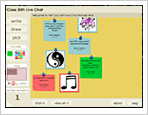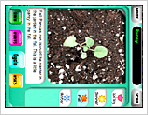 |
 |
| |
 |
|
 |

|
Wonderwalls
Wonderwalls are specialized visual communication
environments which facilitate feelings (a sense of mystery, excitement,
and importance) and thought (reflection and formulating questions)
for individuals and groups. The moderator can respond by live audio
or posted text and encourage interactions, while gaining nuanced
understanding of group mood and thoughts. The electronic Wonderwall
began with the premise to celebrate the asking of questions and
to then use the user generated questions for later discussion and
exploration, evolving through user experience testing and designers'
recognition of technological and human possibilities. PIs: Heeter,
Lownds.
Click
here to learn more. |
 |
 |
 |
|
|
| |
 |
Girls As
Designers
Computer games, designed by young men for
boys and young men, epitomize technology’s exclusion of girls,
their interests, and values. Experts urge more women and girls to
become involved in software and hardware design, to begin to transform
computer culture. The “Involving Girls as Designers”
project looks at what can happen when girls design their own technology-enhanced
science learning experiences. PIs: Heeter, Egidio, Mishra, Winn,
Lownds.
Click here
to learn more. |
|
 |
|
|
|
| |
 |
Cognitive
Games
The Cognitive Games proejct is a collaboration
between game/media designers in Telecommunication, Information Studies,
and Media and content experts in Epidemiology, Psychology, and Neuroscience
at Michigan State University. The goal is to create a subscription-based
web site that provides a series of web-based computer games designed
to exercise various cognitive functions (attention, memory, language,
visual/spatial functions, executive functions) for individuals hoping
to preserve neurocognitive functions as they move from middle to
late adulthood. PIs: Anthony, Winn.
Click
here to learn more. |
|
| |
|
|
|
| |
 |
Alien
Games
ALIEN GAMES
will be...
integrated, out of this world fun interactive science learning and
play about extraterrestrials and astrobiology designed to appeal
to high school and middle school girls to interest them in astrobiology,
space science, and game design. Using the motivational fun of play
and the intrigue of extra-terrestrial life forms ALIEN GAMES will
engage middle school and high school students and particularly girls
in playing, learning and doing astrobiology and other planetary
systems science. PIs: Heeter, Winn, Greene, Egidio, Mishra.
Click
here to learn more. |
|
 |
|
|
|
| |
 |
Diabetes
and You
This project proposes that adults
with low literacy levels are a segment of the population in great
need of study. This population of adults is in danger of falling
behind the general population as more and more health information
moves online. We developed a website, called "Diabetes
and You", designed to deliver general diabetes content to low
literate adults. The website was specifically designed to
inform the general population about diabetes. It includes
six topic areas. One unique tool on this webpage is an interactive
survey that assesses a user’s risk for diabetes based on data
provided for questions regarding risk factors (weight, race, etc.). PIs:
Whitten, Winn.
Click
here to learn more. |
|
 |
|
|
|
| |
 |
Longitudinal
Survey Engine (LSE)
The Longitudinal Survey Engine is
being developed in collaboration with and thanks to support from
the Michigan State University Department of Epidemiology. Designed
for anonymous internet delivery of and research about interactive
health-related interventions, LSE is extremely flexible and customizable.
PIs: Heeter, Anthony, Winn.
Click
here to learn more.
|
|
 |
|
|
|
| |
 |
Chicago
Historical Society Gallery
Chicago Historical Society (CHS) is
in the process of conceptualizing a new Children's Gallery for the
Chicago History Museum. A group of interdisciplinary faculty and
students at Michigan State University are assisting the CHS in conceptualizing
how to integrate technology into the gallery, as well as how to
use technology to expand the impact of the gallery into the broader
museum, city of Chicago, and beyond. PIs: Steinfield, Winn,
Morrisey.
Click
here to learn more. |
|
| |
|
|
|
| |
 |
Electronic
Quit Smoking Coach
Starting as an MA thesis project by
Geraud Plantegenest, we are developing an electronoic quit smoking
agent based on the live telephone coaching system known as Quit
the Nic. We seek to assess the impact of an electronic agent to
perform a similar function as a live human. Our design draws upon
the Captology writings of B.J. Fogg and on research about online
agents. . PIs: Heeter, Anthony.
Click
here to learn more |
|
 |
|
|
|
| |
 |
Personal
Science Assistant (PSA)
In the 4-H Children's Garden kids
are discovering unseen information about plants right in the palm
of their hand using the Personal Science Assistant! This PDA application
reads the plant label (an RFID tag) which brings up information
and pictures about each of the parts of that plant: root, stem,
leaves, flowers, fruit and seeds. Kids discover what each plant
part looks like and what it does. The Cycle button shows what this
plant looks like in Spring, Summer, Fall and Winter. Uses shows
how this plant is used. PIs: Lownds, Heeter.
Click
here to learn more. |
|
 |
|
|
|
|
 |
 |

